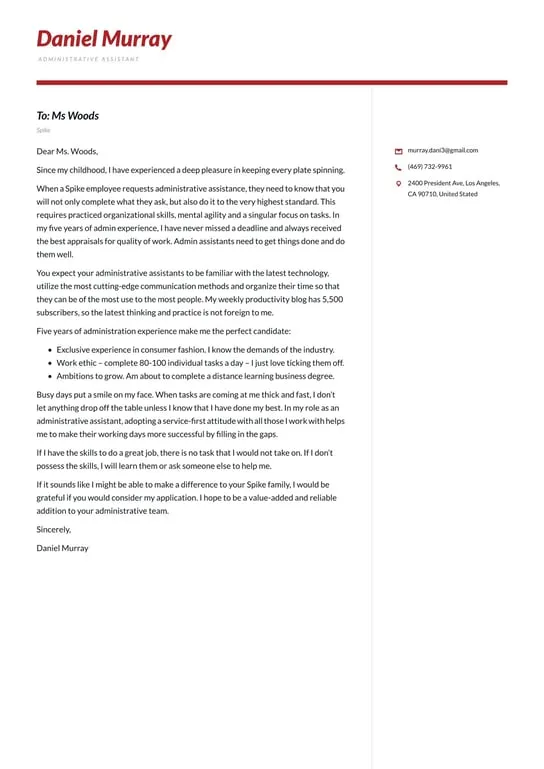What is a Cover Letter and Why is it Important?
A cover letter is your first introduction to a potential employer, a crucial document accompanying your resume when applying for an administrative assistant job. It provides you with the opportunity to showcase your personality, skills, and enthusiasm, setting you apart from other candidates. In essence, the cover letter bridges the gap between the objective facts of your resume and the subjective impression you make. It’s your chance to tell a story, to explain why you’re the perfect fit, and to demonstrate a genuine interest in the specific role and company. A well-crafted cover letter is not just a formality; it’s a powerful tool that can significantly increase your chances of getting an interview. It shows you’ve taken the time to research the company, understand the job requirements, and tailor your application accordingly, making it a vital part of your job application strategy for any administrative assistant role.
Key Components of a Winning Cover Letter
A winning cover letter for an administrative assistant position is more than just a summary of your resume; it’s a targeted pitch that highlights your strengths and demonstrates your understanding of the role’s demands. Several key components are essential for creating a compelling document. Firstly, clear and accurate contact information is crucial. This includes your full name, phone number, email address, and optionally, your LinkedIn profile link. Secondly, a professional and personalized salutation is a must. Generic greetings like “To Whom It May Concern” are outdated; instead, find the hiring manager’s name and address them directly. A well-structured cover letter also features a strong opening paragraph, immediately capturing the reader’s attention by stating the position you’re applying for and expressing your interest. The body of the letter should highlight your relevant skills and experiences, quantify your achievements whenever possible, and address the employer’s specific needs as outlined in the job description. Finally, a confident closing paragraph, expressing enthusiasm and a call to action, is crucial.
Contact Information
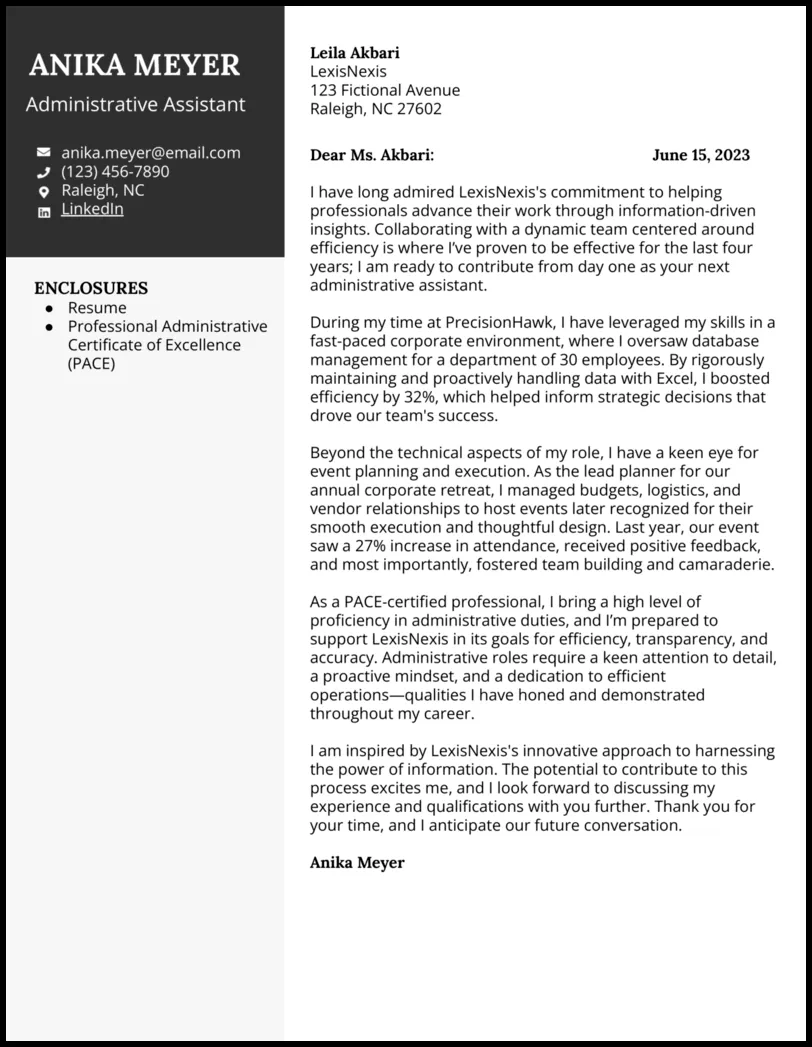
Your contact information should be the first thing a potential employer sees, clearly displayed at the top of your cover letter. It includes your full name, phone number, professional email address, and potentially your LinkedIn profile URL. Make sure that all of this information is accurate and up-to-date. Proofread it carefully to avoid any errors that could prevent the employer from reaching you. Using a professional-looking email address (e.g., john.doe@email.com) is also essential. Avoid casual or unprofessional email addresses. A clear and easily accessible phone number is vital, and ensure that your voicemail is set up professionally. This information is your gateway for the employer to contact you for an interview, so accuracy and professionalism in presentation are important.
Date and Salutation
Following your contact information, place the date of your cover letter. This helps the employer understand when you applied. Below the date, a professional salutation is essential. Avoid generic greetings like “To Whom It May Concern.” Instead, make an effort to find the hiring manager’s name. This shows that you have taken the time to research the company and are interested in the role, not just sending out mass applications. If you can’t find a specific name, try to address the hiring team or the relevant department. Personalizing your salutation will instantly grab the reader’s attention and encourage them to read your cover letter more attentively. This sets the stage for a positive impression and shows you’re proactive.
How to Tailor Your Cover Letter for Each Job
Generic cover letters are quickly dismissed. The secret to success is to tailor your cover letter to each administrative assistant job you apply for. This personalization demonstrates your genuine interest in the specific role and company. Before writing, carefully read the job description, highlighting the essential skills and qualifications the employer seeks. Use this information to customize your letter, emphasizing how your skills and experience align with their needs. Show them you understand the specific requirements and responsibilities of the position. This could involve mentioning the company’s values, the specific projects you’d contribute to, or any relevant experience that makes you a perfect fit. It’s about showing them, not just telling them, that you’re the ideal candidate. Customization makes your application stand out in a crowded field and dramatically boosts your chances of getting an interview.
Research the Company
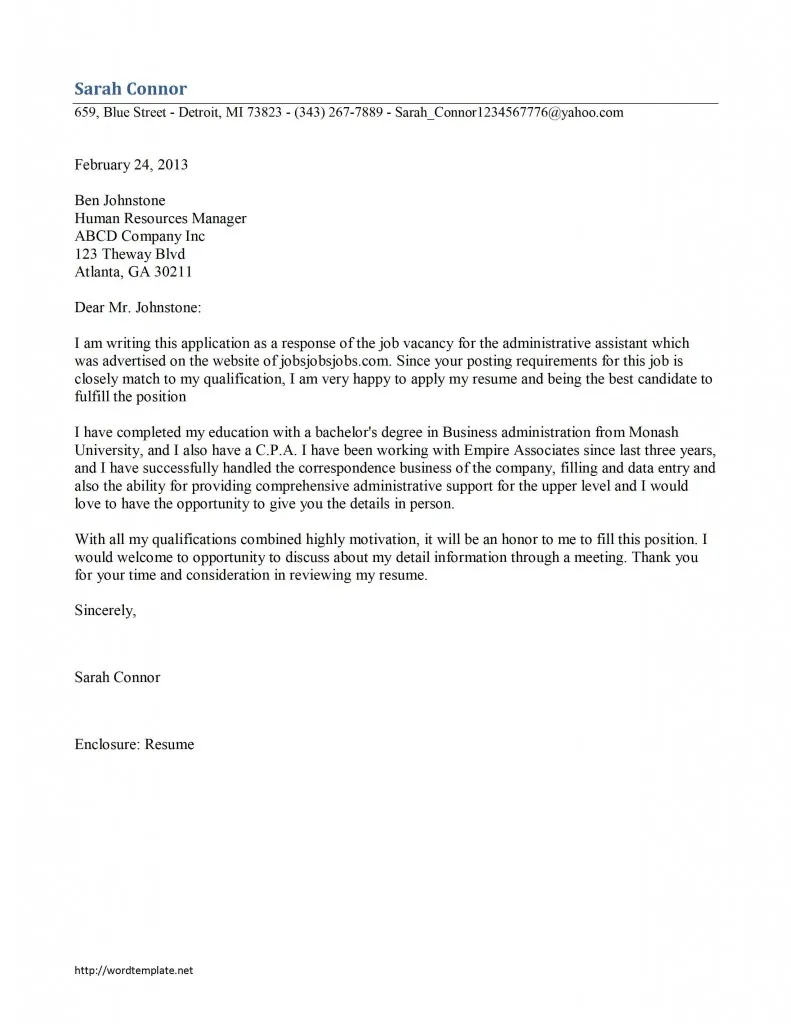
Before you start writing, research the company thoroughly. Visit their website, read recent news articles, and check their social media profiles. Understanding the company’s mission, values, and current projects allows you to tailor your cover letter to their specific needs and show genuine interest. Identify what sets this company apart from others, and integrate that into your cover letter. Does the company emphasize teamwork, innovation, or customer service? Does their mission resonate with your personal values? Mentioning these aspects shows that you’ve gone beyond a cursory review and are truly invested in the opportunity. Researching helps you align your skills and experiences with their specific requirements, which can make a huge difference in demonstrating your suitability for the role.
Highlight Relevant Skills and Experience
Carefully examine the job description and identify the key skills and experiences the employer values. Administrative assistant roles often require excellent organizational abilities, strong communication skills, proficiency in relevant software (Microsoft Office, etc.), and the ability to multitask. When you write your cover letter, highlight those skills, providing specific examples from your previous experiences. For example, instead of saying “I am organized,” describe how you managed complex schedules or organized files that improved efficiency. Be sure to mention any experiences managing calendars, preparing presentations, or handling correspondence. The goal is to show that you possess the essential skills needed to thrive in the position. Make it clear how your previous roles have prepared you for this specific job.
Quantify Your Achievements
To make your cover letter more impactful, quantify your achievements whenever possible. Instead of just stating that you “improved office efficiency,” provide concrete examples. Did you implement a new filing system that reduced paperwork by 20%? Did you streamline processes that saved the company a certain amount of time or money? Quantifiable results make your accomplishments more believable and demonstrate your ability to make a real difference in an administrative role. Use numbers, percentages, and specific data to illustrate the positive impact you’ve made in previous positions. This data proves the value you bring to the table and helps the hiring manager understand the tangible benefits of hiring you. Quantifying your achievements sets you apart from candidates who only list their responsibilities.
Use Action Verbs
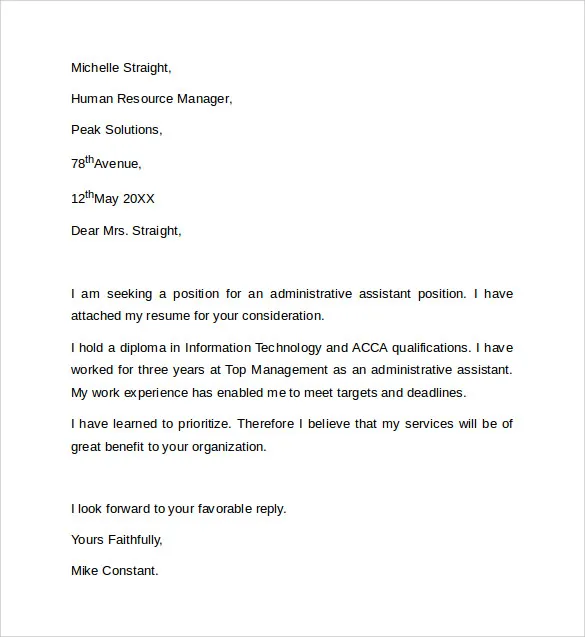
Using strong action verbs throughout your cover letter can make it more dynamic and engaging. Action verbs bring your accomplishments and skills to life, making your letter more compelling. Examples include “managed”, “coordinated”, “implemented”, “streamlined”, “organized”, “achieved”, “improved”, and “developed”. Instead of saying “responsible for scheduling meetings,” write “managed schedules for multiple executives, coordinating over 50 meetings per month.” These words help to emphasize the impact of your actions. Avoid passive language; instead, use active verbs to describe your contributions and accomplishments. This makes your cover letter much more interesting and conveys confidence and competence. Action verbs make your experiences come alive.
Address the Employer’s Needs
A successful cover letter directly addresses the employer’s needs. Review the job description carefully and identify the key requirements. Does the job description emphasize organizational skills, communication proficiency, or software expertise? In your cover letter, highlight how your skills and experience directly align with those needs. Show the employer that you understand what they are looking for and that you possess the qualifications they are seeking. By addressing their needs, you’re demonstrating that you’ve taken the time to understand the position and are prepared to meet its demands. This proactive approach highlights your suitability for the role, as it goes beyond stating your abilities and shows how those abilities fit into the specific requirements of the job, directly benefiting the company.
Formatting and Design for Impact
Your cover letter’s formatting and design are just as important as its content. A well-formatted letter is easy to read, professional in appearance, and conveys attention to detail. Use a clear, readable font like Times New Roman, Arial, or Calibri. Keep the font size between 10 and 12 points. Ensure your letter has consistent spacing, including single-spacing within paragraphs and double-spacing between paragraphs. Use ample white space to avoid a cluttered look. Divide your letter into concise paragraphs to improve readability. A well-designed cover letter shows that you pay attention to detail and present yourself professionally. It enhances the overall impact of your message and makes your application more appealing. An organized layout and easy-to-read format will make your cover letter stand out and improve your chances of being considered.
Choose a Professional Font
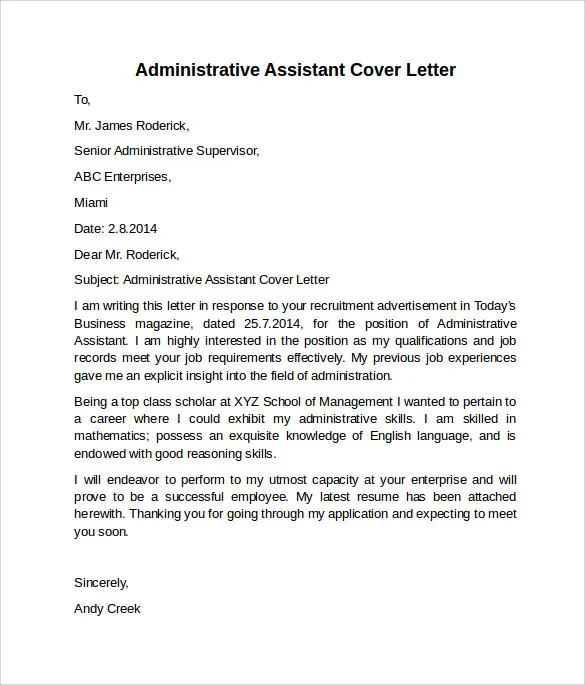
The font you choose for your cover letter significantly impacts its readability and professionalism. Stick to classic, professional fonts like Times New Roman, Arial, Calibri, or Georgia. These fonts are easy to read and are widely accepted in business communications. Avoid using overly stylized or decorative fonts, as they can distract the reader and make your letter look unprofessional. Keep the font size between 10 and 12 points for optimal readability. Consistency is key – use the same font throughout your cover letter. Selecting the appropriate font enhances the visual appeal of your letter and conveys a sense of professionalism and attention to detail, which are very important for administrative assistant positions. It ensures your message is clear and easy for the hiring manager to read.
Keep it Concise and Easy to Read
Hiring managers are busy, so make your cover letter concise and easy to read. Aim for a single page, typically around 250-400 words. Use clear, straightforward language and avoid overly complex sentences or jargon. Break up long paragraphs into shorter ones to improve readability. Use bullet points to highlight key skills or achievements, making them easy to scan. Focus on the most relevant information, highlighting your key strengths and how you meet the job requirements. A clear and concise cover letter demonstrates respect for the reader’s time and shows that you can communicate effectively. Being to the point makes it more likely the hiring manager will absorb all your essential information. This maximizes the impact of your message and holds their attention.
Proofread and Edit Thoroughly
Proofreading and editing your cover letter is extremely important, as it reflects your attention to detail – a crucial skill for an administrative assistant. Before submitting your letter, carefully check for any grammatical errors, spelling mistakes, and typos. Read your letter aloud to catch awkward phrasing or sentences that don’t flow smoothly. Use spell-check and grammar-check tools, but don’t rely on them entirely. Have a friend or family member review your letter for a fresh perspective. Errors can make your cover letter seem unprofessional and may lead to your application being immediately rejected. Taking the time to thoroughly proofread and edit your cover letter demonstrates your commitment to excellence and your attention to detail, which are valuable assets in administrative work. A polished cover letter increases your credibility and reinforces a positive first impression.
Common Mistakes to Avoid
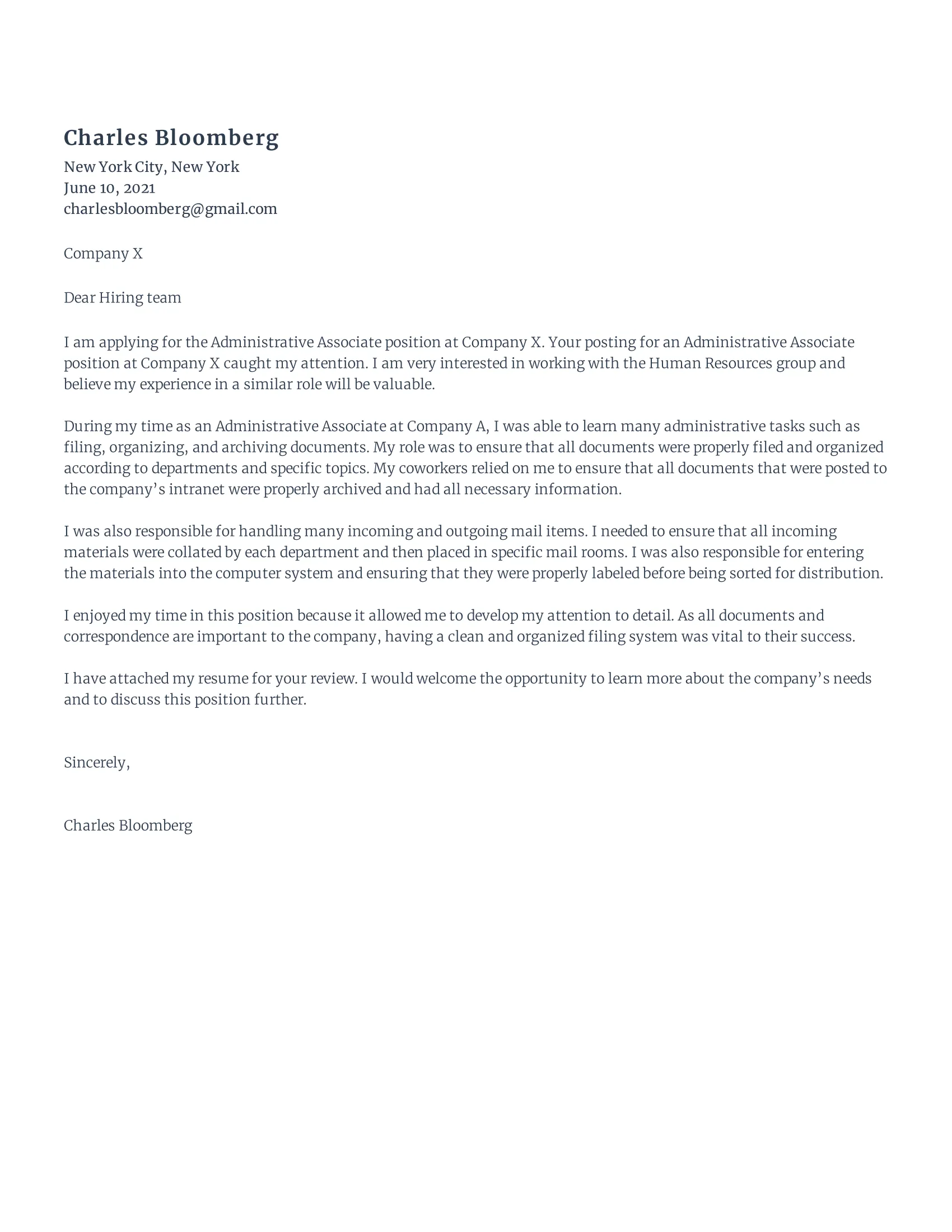
Certain common mistakes can significantly damage your chances of getting an interview. Being aware of these pitfalls allows you to create a stronger cover letter that highlights your skills and experience effectively. Avoid generic cover letters, typos, and focusing too much on yourself instead of the needs of the employer. A personalized cover letter is essential. Taking the time to learn about the job and company will dramatically improve your chance to get hired.
Generic Cover Letters
Generic cover letters, those that can be used for any job, are a major red flag. Employers can immediately tell when a cover letter has not been tailored to their specific role or company. This suggests a lack of genuine interest and attention to detail. Customization demonstrates that you’ve taken the time to understand the job requirements and are genuinely interested in the opportunity. Avoid using generic templates without making significant changes. Instead, personalize each letter by highlighting how your skills and experiences match the specific needs of the role. Research the company and address their specific needs in your letter to demonstrate your interest and show that you have the skills to thrive in their environment. Personalization is the key to making a strong impression.
Typos and Grammatical Errors
Typos and grammatical errors are unacceptable and can immediately disqualify your application. They reflect a lack of attention to detail and unprofessionalism. Administrative assistants are often tasked with handling important documents and correspondence, so employers expect impeccable writing skills. Before submitting your cover letter, carefully proofread it for spelling mistakes, grammatical errors, punctuation issues, and awkward phrasing. Use spell-check and grammar-check tools, but don’t rely on them entirely. Read your letter aloud and have a friend or family member review it. A polished cover letter demonstrates your ability to produce accurate and professional documents, a key requirement for administrative assistant roles. The attention to detail is critical.
Focusing Too Much on Yourself
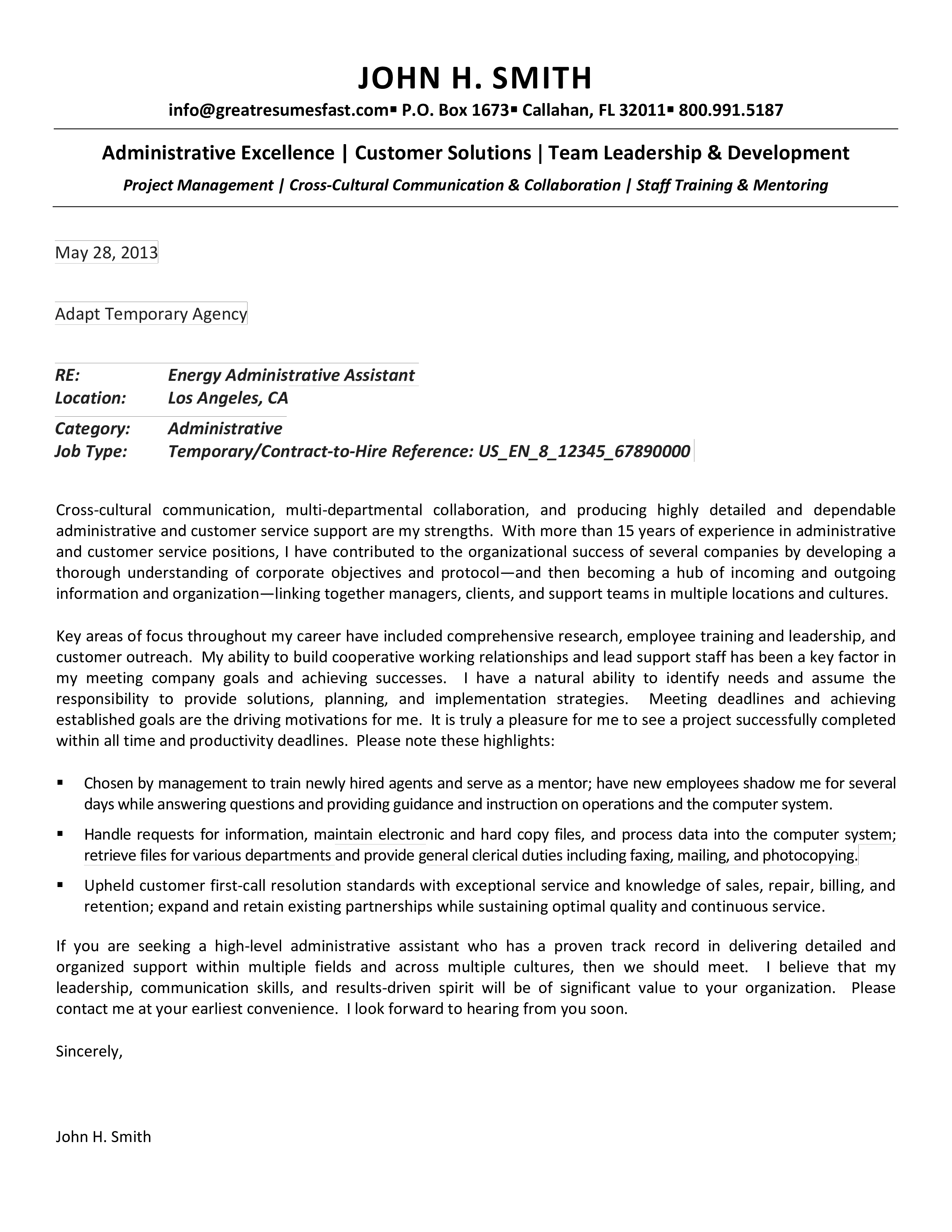
While it’s important to highlight your skills and experience, avoid focusing too much on yourself and your personal needs. Instead, shift your focus to the employer and how you can contribute to their organization. Frame your skills and experience in terms of how they can benefit the company. Instead of saying, “I want a job that offers growth opportunities,” describe how your skills and past experiences make you a valuable asset to the company. This shift demonstrates that you understand the needs of the employer and are interested in helping them achieve their goals. By focusing on how you can solve their problems and contribute to their success, you make a stronger case for being hired. This approach shows that you understand and value the importance of focusing on the organization’s priorities, rather than just your own.
Closing with Confidence
Your closing paragraph should be a strong, confident statement. It’s your last chance to make a positive impression and encourage the employer to take the next step. Make sure your closing paragraph is professional, enthusiastic, and includes a clear call to action.
Expressing Enthusiasm
In your closing paragraph, express your enthusiasm for the administrative assistant position and the company. Reiterate your interest in the role and how your skills and experience align with the requirements outlined in the job description. Show that you are genuinely excited about the opportunity. You can mention something specific that attracted you to the company or the position. Expressing enthusiasm makes you more memorable and demonstrates your proactive approach to the application. This will make you more appealing to the hiring manager and may give you an edge over less enthusiastic candidates.
Call to Action
End your cover letter with a clear call to action. Let the employer know you’re looking forward to hearing from them. Provide your contact information if it’s not already at the top. You can say something like, “I am eager to discuss how my skills and experience can benefit your team. Thank you for your time and consideration. I look forward to hearing from you soon.” or “I welcome the opportunity to discuss my qualifications further in an interview.” This ensures that the hiring manager knows the next steps you would like them to take, and is a clear signal that you’re interested in proceeding with the hiring process. A strong call to action shows that you are proactive and eager to move forward with your application.
